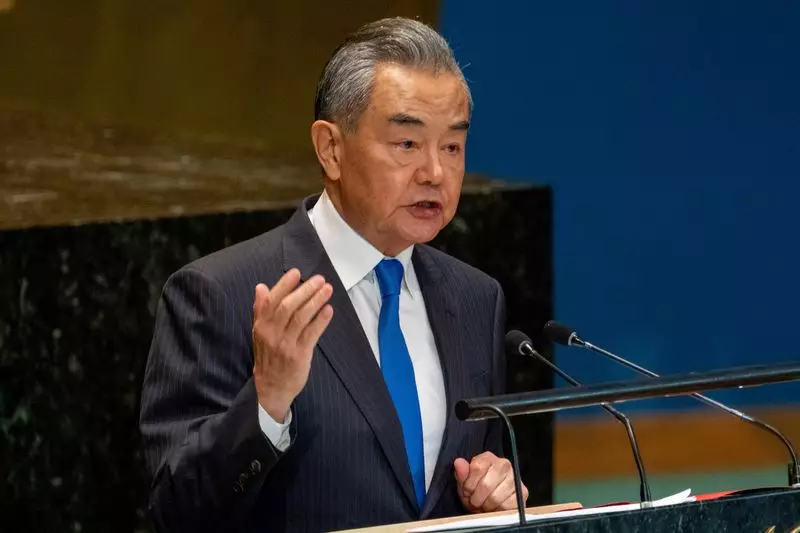China’s commitment to Africa is not a new phenomenon, but a deeply entrenched tradition that spans over three decades. The recent visit by Foreign Minister Wang Yi symbolizes the continuation of this strategy as he embarks on a significant diplomatic tour of the continent. While other major global players, particularly from Europe and the United States, experience fluctuations in their focus and commitments toward Africa, China seems resolutely engaged. This steadfastness is not merely about altruistic gestures; it highlights China’s increasing leverage in a resource-rich region that holds immense potential for economic partnerships.
The geopolitical landscape is drastically evolving, particularly with the anticipated return of U.S. President-elect Donald Trump, as well as ongoing conflicts in Ukraine and the Middle East, which occupy the attention of Western leaders. This moment of distraction creates a vacuum in African diplomacy, one that China is poised to fill. Wang Yi’s tour—covering nations such as Namibia, the Republic of Congo, Chad, and Nigeria—underscores China’s strategic intent to consolidate its influence in Africa. According to experts, the selection of countries is often not driven by conventional logic but serves as a potent reminder of China’s reliability and consistent strategies in comparison to Western counterparts.
China’s economic ambitions are increasingly focused on Africa, which presents a dual opportunity: to secure essential resources and expand market access for its manufactured goods. As China grapples with a slowing economy, the need for external markets becomes more critical—especially in areas like electric vehicles and solar technology, where American and European competitors claim overcapacity. The visit by Wang is, therefore, not merely ceremonial; it is a calculated approach to reinforce China’s economic foothold while offering developing nations financial support in exchange for strategic partnerships.
Experts like Mao Ning of the Chinese Foreign Ministry have emphasized that these diplomatic engagements aim for “practical cooperation” that fosters sustainable growth in China-Africa relations. The implications of such collaborations extend beyond simple trade; they provide China with a more profound influence on global institutions. Africa’s substantial voting bloc at the United Nations can help Beijing advocate for a geopolitical narrative that aligns with its strategic priorities, particularly concerning human rights, which often clash with China’s own agenda.
As the landscape of global diplomacy shifts away from traditional Western influence, China is rapidly positioning itself as a central actor in Africa’s development narrative. The foundational changes in policymaking and leadership within African nations reflect China’s burgeoning impact. As noted by Hannah Ryder, who founded Development Reimagined, candidates vying for leadership positions in institutions like the African Union are increasingly looking to China for inspiration. This is evident in discussions centered around boosting Africa’s manufacturing capabilities and enhancing educational frameworks—a departure from previous dependency on Western models.
Such engagements not only highlight a growing partnership but also suggest a paradigm shift in how African nations perceive their development strategies. With China demonstrating a willingness to invest in infrastructure and education, it is becoming an essential part of the solution to the continent’s pressing challenges.
Amid underlying economic motivations, Wang Yi’s visits also underscore the importance of security issues within the African context. His itinerary includes a stop in Chad, particularly relevant since France, historically a key player in regional security, has begun pulling its military presence. As countries like Chad pivot away from their traditional alliances, China’s interest in security cooperation may become increasingly evident. This shift could engender a new landscape in which Beijing plays a significant role in addressing regional security challenges.
As China deepens its engagement in African geopolitics through initiatives like the Forum on China-Africa Cooperation, it is essential to note that these actions are not merely pragmatic but strategically calculated to redefine the socio-political fabric of the continent.
Wang Yi’s diplomatic tour is emblematic of a broader strategy wherein China seeks to reinforce its influence across Africa while simultaneously addressing its own economic needs. The emphasis on cooperation not only strengthens mutual ties but also positions China as an indispensable partner in Africa’s quest for development. As global dynamics continue to evolve, it will be critical to monitor how this relationship unfolds and what implications it holds for both China and the African nations involved.

